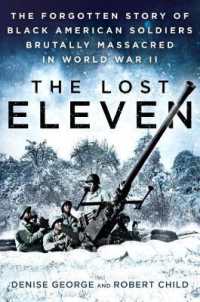Full Description
"First we crushed our enemy, then saved him from starvation," Walter Cronkite intoned in a 1963 episode of the CBS television series The Twentieth Century. Designed to commemorate the upcoming fiftieth anniversary of US aid to Europe during World War I, the episode explained that the American military had "crushed" other nations in both world wars, a violence described as a necessary corrective in order to subsequently unleash "the spirit of the American people." This humanitarian "spirit" manifested as material relief not only to friend but also to former foe. With only a small commentary on the ingratitude of some recipients, the documentary emphasized for Americans their unique role in global peacekeeping and prosperity, functioning as a global patriarch, bearing both carrots and sticks.
Saving Europe offers a transnational history of American aid and intervention in Europe between 1914 and 1924, a period when the US simultaneously tightened its borders and expanded its reach. In that crucial decade after the outbreak of World War I, Americans saw themselves in a novel role as protectors of European cultural heritage and as rescuers of vulnerable populations, making them worthy successors to earlier global powers. Saving Europe shines a light on how the US wielded "soft" power in the interwar period through food, dollars, and reconstruction projects. In case studies of Belgium, France, Austria, Germany, and Poland, it traces the development of American views of their role in the wider world as well as European responses to this intervention, providing valuable context for later US global aid and development regimes after World War II.
Contents
Acknowledgments
Introduction
1. Belgium: Entering the Fray
2. France: Rebuilding Europe
3. Austria: Saving the Children
4. Germany: Friends and Enemies
5. Poland: Americanizing Abroad
6. Europe: Defining and Defending Western Civilization
Legacies: Saving the World
Bibliography






